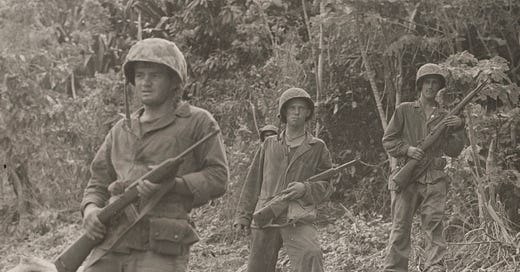
This series begins with the following post. Thus, if you have not done so before, you will want to begin by reading it (or, better yet, devising a solution to the problem it presents.)
You decide to give Private Gabaldon a chance to prove his worth. You therefore arrange for his assignment to the scout-observer squad of the intelligence section (R-2) of the 2nd Marines.
On the afternoon 15 June 1944, your section lands on the island of Saipan. Thanks to the absence of Japanese soldiers on the beach, the ship-to-shore movement takes place without incident.
You lead your section to a bivouac area, post a watch, and tell your men to get as much rest as they can.
‘Tomorrow,’ you explain, ‘we are going to hike to a piece of high ground and set up an observation station.’
During the night, you make the rounds of your section’s bivouac. You count the Marines, both those who are sleeping and those who stand guard over their comrades.
All of your men are where they are supposed to be, all, that is, save Guy Gabaldon.
Soon after dawn, Private Gabaldon walks in the bivouac area.
You ask Gabaldon to explain his absence. He responds by telling you a story.
‘Last night, I went hunting. I left our lines and headed north. The first thing I ran into was a trench full of corpses. At the far end of a trench I saw three Japanese soldiers. I crawled through the trench, got close to them, and told them to surrender. One tried to resist, so I shot him. The other two raised their hands. I told them that, as long as they did what I said, they would be OK.’
‘I took the prisoners to the division language officer, told him where I found them, and headed back here.’
You check with the division language officer. He confirms Gabaldon’s story.
What now, Captain?
Please use the comments section to propose answers to this question. I will post the historical solution on Saturday, 14 June 2025.









Well, You chew his backside with the Company Gunny standing a few away. Reminding the Private that if he had been captured he would have been jeopardizing the defensive and offensive posture of the Company, Battalion and regiment. Next time he wants to go hunting he can check in with the Gunny. That all said, you wouldn’t want to hurt his initiative and when the ass chewing was over, let him know good work. Then get a further brief on what he did, what he saw and so forth and then organize a brief for the company, one way or the other to get the word sifting down to all hands. General Van Riper had a true story of a similar event in Vietnam. a young Lance Corporal and two others Marines unhappy with he pace of the war effort went out hunting on their own, luckily they were stopped before they got too far down the road out past the gate. It’s a great story. The Lance Corporal later on was killed in an action where he displayed uncommon valor and saved several Marines while giving up his own.
I’d love to say “good initiative, bad judgement” but I can’t argue with the results. Japanese POW’s are hard to come by and the intel potential is immense. Any attempt to discipline him is counterproductive given that the objective of USMC leadership is mission accomplishment and he’s batting 1.000.” So, I’m going to say, “great work, Marine. But we need to coordinate your efforts for maximum results. Two rules: don’t go out alone and don’t go out without telling me or section chief where you’re going. Understood? OK. Now, what do you think is your next best patrol route, Devil Dog?”